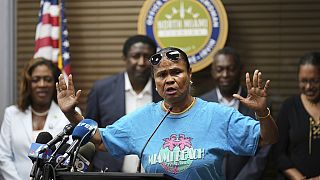Darfur Sudan
Clashes between rival tribes in Darfur have left more than 130 people dead, two weeks after the end of a peace mission in the volatile region of western Sudan.
The violence is the deadliest since the end on December 31 of the joint UN (UNAMID) and African Union (AU) peace mission in Darfur, which has been operating in the vast region for 13 years.
On Monday, at least 47 people were reported killed while 83 died in separate weekend clashes.
The official Sudanese agency Suna, citing the local branch of the doctors' union, had earlier reported a death toll of 48 and 97 injured, and said the clashes were continuing.
"The number of deaths from the bloody events that took place in El-Geneina, capital of West Darfur, has increased since Saturday morning (...) and 160 wounded including members of the armed forces," the Central Committee of Sudanese Doctors, close to the protest movement that led last year to the fall of President Omar al-Bashir, said Sunday on Twitter.
Clashes erupted between the Al-Massalit tribe and Arab nomads after a dispute between two individuals. Armed militias from the region sympathetic to the Arab nomads then attacked El-Geneina and several houses were set on fire, according to witnesses.
Khartoum has imposed a curfew in West Darfur since Saturday and Prime Minister Abdullah Hamdok has sent a "high-ranking" delegation there to try to restore order.
For its part, the UN expressed its "deep concern" about these violent developments.
"The Secretary-General (of the UN, Antonio Guterres) calls on the Sudanese authorities to make every effort to de-escalate the situation, end the fighting, restore law and order and ensure the protection of civilians," said in a statement his spokesman, Stephane Dujarric.
The local branch of the doctors' union called on the authorities to "secure health facilities," warning that the toll of wounded is likely to rise, according to Suna.
On Sunday, Abdel Fattah al-Burhane, President of the Sovereign Council in charge of steering the political transition in Sudan, called an emergency meeting of the security services on the issue.
For its part, the Association of Sudanese Professionals, one of the spearheads of the protest movement, said the violence had spread to camps for internally displaced persons.
"Part of the Kerindig camp was burned down and extensive damage (...) forced people to leave," it said in a statement. "These events have shown that the spread of weapons (...) is one of the main causes of the deterioration of the situation.
Darfur is experiencing an upsurge in tribal clashes, which left 15 people dead and dozens injured at the end of December, a few days before the end of the joint UN-AU peace mission.
The gradual withdrawal of troops from this mission, scheduled to begin in January 2021, will be spread over six months. The Sudanese government is thus taking responsibility for the protection of the people of the region.
- Land, water -
The conflict in Darfur began in 2003 between forces loyal to General Omar al-Bashir's regime in Khartoum and members of ethnic minorities who considered themselves marginalized and demanded a more equitable distribution of power and wealth.
The violence left some 300,000 people dead and more than 2.5 million displaced, mostly in the early years of the conflict, according to the UN.
To fight the insurgents, the Bashir government had deployed the Janjaweed, an armed militia composed mainly of Arab nomads, accused of "ethnic cleansing" and rape. Thousands of militiamen were later incorporated into the Rapid Support Forces (RSF), a paramilitary group.
While violence has decreased in intensity, clashes over access to land and water between nomadic Arab pastoralists and Darfuri farmers remain frequent.
The Sudanese transitional government - installed after the fall of autocrat Omar al-Bashir under the pressure of popular protest - signed a peace agreement in October with several rebel groups, including in Darfur.
After UNAMID, which has numbered up to 16,000 troops, the UN will remain in Sudan through a United Nations Integrated Mission for Transitional Assistance in Sudan (UNAMIS).
This political mission will have the task of assisting the transitional government, installed in August 2019 and resulting from an agreement between the military and leaders of the protest movement. It will also help implement recent peace agreements in areas ravaged by conflict.
Omar al-Bashir, in prison, and other Sudanese officials are wanted by the International Criminal Court (ICC) for "crimes against humanity" and "genocide" in Darfur.













01:10
At least three killed after AU military helicopter crashes in Somalia's Mogadishu airport
01:22
World will have to learn to live with heatwaves, UN says
01:39
Sustainable development financing conference opens in Seville
01:49
Sudanese refugees in Chad face deepening humanitarian crisis
01:35
UN and Haitian officials mark one year since Kenyan police arrived to support security efforts
01:42
Gaza residents welcome rare organized aid delivery after months of chaos and hunger